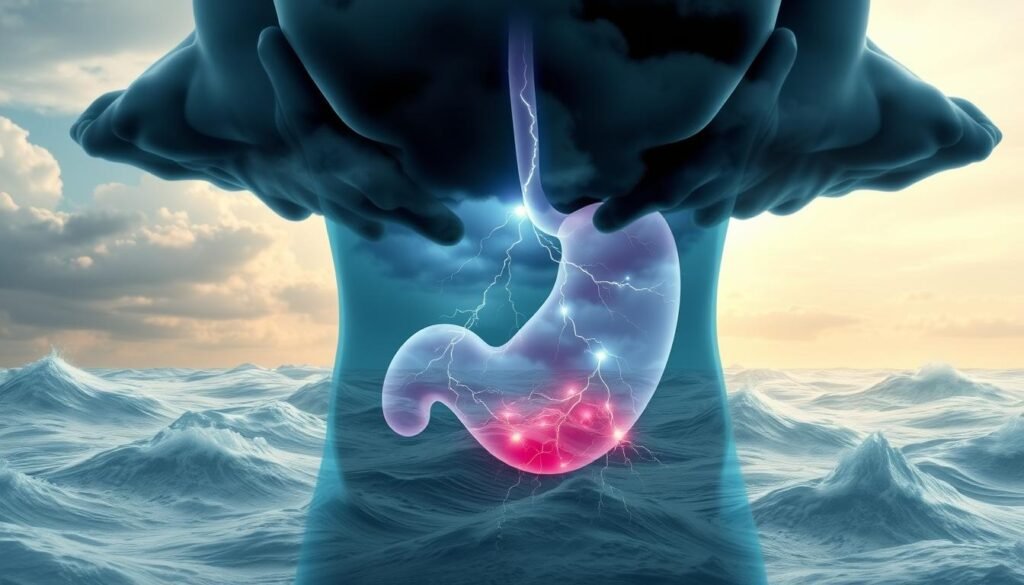Did you know that more than half of people with anxiety also have stomach problems? These include feeling sick to their stomach. This shows how stress and health are closely linked. For many, anxiety is more than feeling worried. It also brings physical issues that affect daily life. The connection between anxiety and issues like feeling nauseous shows how our minds and bodies work together.
It’s key for people dealing with these issues to understand their feelings of sickness. Anxiety disorders range widely and can harm different parts of the body. This leads to more problems that affect overall health. In this article, we explore how anxiety and physical feelings are related. We aim to give deeper insights on handling these feelings.
Key Takeaways
- Anxiety affects 50% or more of individuals through gastrointestinal issues like nausea.
- 7–16% of the U.S. population has irritable bowel syndrome (IBS), often made worse by anxiety.
- Chronic anxiety may lead to other conditions, including depression.
- Panic disorder can greatly increase the chance of feeling nauseous and other symptoms.
- Mindfulness exercises and seeking help from professionals are good ways to manage these issues.
The Link Between Anxiety and Physical Symptoms
Anxiety triggers many physical symptoms as the mind and body are closely linked. When anxiety hits, people might feel really sick. This can mean feeling nauseous, short of breath, dizzy, and tired. The connection between anxiety and nausea is especially strong. Scientists say this happens because of our body’s stress response and stress hormones like cortisol.
Anxiety can weaken our immune system, making us more likely to get sick. This creates a cycle of feeling unwell. Symptoms like swollen glands, a dry tongue, and major stomach pain, including throwing up from anxiety, are common. Situational anxiety, like what we feel before big events such as exams or proposing, can make us temporarily feel sick.
But for those with chronic anxiety, the sick feeling lasts longer. It can drain their energy and affect daily life. This might mean they have an anxiety disorder that needs attention. While some meds can help with symptoms like nausea, reducing anxiety long-term is key to feeling better.
Studies show anxiety is linked to other health problems too. A 2015 study found a link between anxiety and ulcers. And as symptoms of anxiety or depression got worse, people were more likely to develop asthma, heart issues, and migraines. This shows the big effect anxiety can have on our health.
| Physical Symptoms | Potential Consequences |
|---|---|
| Nausea | Anxiety vomiting |
| Fatigue | Impaired daily activities |
| Dizziness | Increased risk of falls |
| Swollen glands | Distress and anxiety |
| Dry tongue | Difficulties in eating or drinking |
The experience of anxiety and physical symptoms can make us more worried about our health. This might make things worse. Knowing about these links is important for managing and understanding them better.
What Does It Mean When Anxiety Makes Me Feel Sick
Anxiety can show up in many physical ways. Feeling nauseous is one common way. This can be just a slight discomfort or strong enough to mess with daily life. These feelings can impact work, school, and relationships.
Some people have stomach issues because of their anxiety. It can be a sign of having a lot of stress or an anxiety disorder. Anxiety disorders include different types, like generalized anxiety disorder, panic disorder, and specific phobias. All these can make someone feel physically sick.
Nausea can often come back for those with anxiety. It shows how our bodies react to emotional stress. It’s important to take care of both mental and physical health. Knowing the link between our mind and body helps find ways to cope and get the right therapy.

| Type of Anxiety Disorder | Common Symptoms | Impact on Physical Health |
|---|---|---|
| Generalized Anxiety Disorder | Chronic worry, muscle tension, irritability | Nausea, indigestion, fatigue |
| Panic Disorder | Intense fear, panic attacks | Chest pain, dizziness, nausea |
| Social Anxiety Disorder | Fear of judgment in social scenarios | Nausea, sweating, trembling |
| Obsessive-Compulsive Disorder | Uncontrollable anxious thoughts | Indigestion, nausea from compulsive behaviors |
| Post-Traumatic Stress Disorder | Flashbacks, nightmares, hyperarousal | Nausea, irritability, physical tension |
Understanding the Science Behind Anxiety and Nausea
The science behind anxiety shows how it affects our mind and body. Anxiety can cause physical symptoms like nausea. This is because of the anxiety and gut connection. It’s important for our health. Anxiety disorders such as Generalized Anxiety Disorder (GAD) and Obsessive-Compulsive Disorder (OCD) often have both emotional and physical effects, including nausea.
Anxiety leads to hormonal changes in our body. These changes can make our heart rate go up and can upset our stomach, making us feel nauseous. The vagus nerve plays a key role in connecting our brain and gut. This is why anxiety often causes digestive problems, like nausea, diarrhea, and not feeling hungry.
In the U.S., nearly 3% of adults have anxiety disorders. It’s important to understand how it works because long-term anxiety can harm our immune system. It can make us sick in different ways. Treatments usually focus on both the mind and body. They can include therapy and medication to help people feel better.

| Anxiety Disorder | Common Symptoms | Physical Effects |
|---|---|---|
| Generalized Anxiety Disorder (GAD) | Excessive worry, muscle tension, irritability | Nausea, appetite loss |
| Obsessive-Compulsive Disorder (OCD) | Intrusive thoughts, compulsive behaviors | Nausea, gastrointestinal distress |
| Social Anxiety Disorder (SAD) | Nausea, sweating, trembling | Digestive issues, hot flashes |
| Panic Disorder | Panic attacks, chest pain | Nausea, shortness of breath |
Understanding these symptoms and their causes shows why we must treat both the mind and body. Good treatment plans can really help improve the lives of those with anxiety.
Anxiety and Stomach Issues: Common Symptoms
Anxiety often occurs alongside stomach problems. The gut has many nerves, making it closely connected to our mental state. This connection means anxiety can lead to stomach issues, impacting life quality.
Here are some typical stomach problems caused by anxiety:
- Nausea
- Diarrhea
- Constipation
- Acid Reflux
These issues can cause a lot of discomforts. They may start a cycle where anxiety worsens gut problems. For instance, stomach pains can make someone worry more about their digestive health.
Stress hormones from anxiety affect digestion. They can cause too much hunger or make you not want to eat. Long-term, this cycle of anxiety and digestive issues can lead to serious gut health fears.
It’s important to manage anxiety to help these symptoms. Activities like yoga can lower stress. They lead to a sense of well-being by releasing mood-boosting endorphins. This also aids digestive health.
Knowing how anxiety and stomach issues are linked is key. Without treatment, these gut problems can become worse, posing bigger health risks. If you have constant gastrointestinal symptoms, seeing a specialist is a good idea.

To learn more about how to handle anxiety-related vomiting and other stomach issues, check this resource.
How Panic Attacks Contribute to Anxiety-Related Nausea
Panic attacks bring on intense fear, starting the fight-or-flight response. This reaction causes various physical issues, including nausea. When anxiety attacks grow, symptoms like stomach churning show up. This makes the fear of nausea even worse.
Digestion gets disrupted as the body handles panic attacks. This leads to nausea and an upset stomach feeling. Alongside, symptoms like a faster heart rate, sweating, or dizziness might appear. Knowing these signs helps tell apart nausea from panic attacks from stomach problems.
Several methods can help deal with this type of nausea. Deep breathing and ginger help ease the discomfort. Also, aromatherapy with peppermint or lavender oils can be calming. It’s important to tackle emotional triggers to lessen ongoing issues.
During panic attacks, paying attention to how one behaves is key. Some may notice body sensations more than others. Not everyone feels nauseous in panic attacks, but those who do worry about their health. Understanding panic attacks and nausea leads to seeking help. This can be through lifestyle adjustments, support groups, or therapy platforms like Talkspace.
Coping with Anxiety Sickness
Many people struggle with anxiety sickness, which greatly affects daily activities. Learning effective breathing methods and mindfulness can ease discomfort. It also improves emotional health.
Effective Breathing Techniques
Using good breathing techniques is key to handling anxiety. Methods like box breathing and belly breathing give quick relief during anxious times. Box breathing requires you to breathe in for four counts, hold for four, breathe out for four, and wait four before starting again. This method helps calm your nerves and brings your focus to now.
Belly breathing lets you breathe deep with your diaphragm, not your chest. This practice lessens tension and helps you feel in control, fighting off anxiety. Doing these exercises often builds your defense against anxiety sickness.
Mindfulness and Relaxation Exercises
Mindfulness is very helpful for anxiety. It teaches you to live in the moment. You learn to watch your thoughts and feelings without judging them. Adding mindfulness to your daily life helps you understand your anxiety better. It also teaches you how to handle stress. Techniques like guided imagery and muscle relaxation loosen tense muscles and calm your mind.
Adding these calming exercises to your day can boost your ability to deal with anxiety. Even small actions, like focusing on your breath or a mindful walk, can make a big difference in your mood.
| Breathing Technique | Description | Benefits |
|---|---|---|
| Box Breathing | Inhale, hold, exhale, and wait for equal counts. | Calms the nervous system and focuses the mind. |
| Belly Breathing | Focuses on deep breathing using the diaphragm. | Reduces tension and promotes control over anxiety. |
Embracing these techniques is crucial for managing anxiety well. By making these methods a priority, people can begin to conquer the hurdles that anxiety brings.
Managing Anxiety-Related Nausea
Handling anxiety-related nausea means paying attention to what you eat and drink. Choosing the right foods and keeping hydrated can really help ease the discomfort. By getting your diet and fluid intake right, you not only fight off nausea but also boost your health.
Dietary Considerations for Relieving Nausea
To deal with anxiety-related nausea, certain foods are your allies. It’s best to stick to bland, easy-to-digest foods to calm your stomach. Here are some food tips:
- Eat small meals often throughout the day.
- Go for bland options like crackers, rice, or bananas to avoid stomach upset.
- Steer clear of greasy and overly spicy foods as they can make nausea worse.
- Try ginger for its anti-nausea effects, either as tea or a supplement.
- Keep your blood sugar balanced with complex carbs to help regulate energy and mood.
Hydration Tips
Staying hydrated is key to easing nausea, especially when anxiety affects your desire to eat. Hydrating helps with nausea and supports better digestion. Here are some tips for keeping up your fluid intake:
- Drink clear liquids, like water and herbal teas, for comfortable hydration.
- Avoid drinks with caffeine or lots of sugar, as they might dehydrate you or worsen nausea.
- If you’re vomiting or sweating a lot, choose drinks with electrolytes to replace lost fluids.
- Use ice chips or popsicles if drinking fluids is too challenging.
By focusing on the right foods and drinks, you can effectively fight anxiety-related nausea. This approach helps anyone looking to regain their health balance and ease those unsettling feelings of nausea caused by anxiety.
When to Seek Medical Help for Anxiety-Related Symptoms
Knowing when to get medical help for anxiety is key. Symptoms like ongoing nausea, panic attacks, and sleep problems disrupt daily life. If these issues last more than six months or severely impact life, see a doctor.
Some common signs of anxiety include stomach troubles and feeling very tired. It’s crucial to know when to see a doctor if panic attacks happen often. Sometimes, anxiety symptoms can seem like other medical issues, including diabetes or thyroid problems.
Difficulty focusing and muscle tension are signs of anxiety disorders. By knowing these symptoms, people can better understand their condition. Visit this page to learn more about anxiety-related symptoms.
The table below shows when to seek professional help:
| Signs to Seek Help | Description |
|---|---|
| Persistent Symptoms | Symptoms that last over six months, affecting daily activities. |
| Physical Symptoms | Feeling nauseous, a fast heartbeat, and breathing difficulties. |
| Sleep Disturbances | Regular trouble with getting or staying asleep. |
| Panic Attacks | Often having panic episodes that feel like emergencies. |
| Impact on Daily Life | Struggling to do everyday tasks or be social. |
Being aware of these signs helps in making wise health decisions. Getting medical advice for anxiety can relieve distress and enhance life quality.
Conclusion
Knowing how anxiety affects us is key for anyone feeling sick, like having stomach pain or nausea. These issues often come from our body’s fight-or-flight response, which is due to stress hormones like adrenaline. By understanding this connection, we can better figure out how to manage anxiety.
Thinking in certain ways, like assuming the worst, can make anxiety worse. This can lead to more health problems. If we learn to recognize and question these thoughts, we can improve both our minds and bodies. Using techniques like deep breaths or eating mindfully can also ease the nausea linked to anxiety.
If dealing with anxiety feels too hard alone, getting professional help is key. Using self-help tips, understanding our thoughts, and getting expert advice can make a big difference in how we feel, inside and out. The most important thing is to start taking positive actions to fully understand and tackle anxiety.